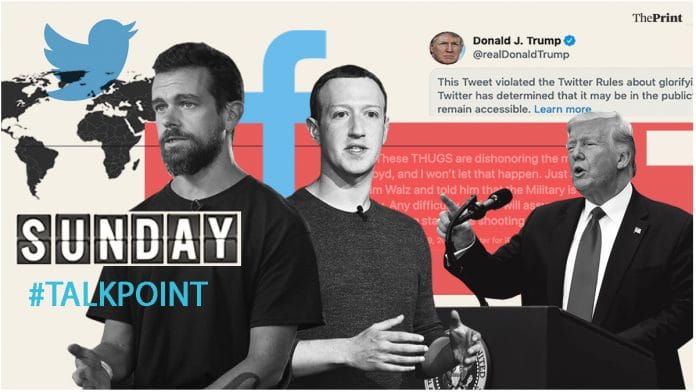Citing copyright issues, Twitter, Facebook and Instagram disabled US President Donald Trump’s campaign tribute video to George Floyd on their sites Friday. Earlier, Twitter issued a fact-checking warning on Trump’s controversial tweet threatening Minneapolis protesters. Trump signed a retaliatory order seeking to curb protections that shield social media platforms from content published on their platforms. Facebook employees called out Zuckerberg Thursday over his decision not moderate or take down Trump’s post.
ThePrint asks: Should Twitter, FB censor world leaders like Trump or remain platforms for freedom of speech?
Internet is our final bastion of free speech. We wouldn’t want to lose that over someone like Trump
 Regina Dulanjali Mihindukulasuriya
Regina Dulanjali Mihindukulasuriya
Senior Correspondent, ThePrint
It’s difficult to answer this without fearing being attacked by trolls but social media platforms should remain platforms that practice freedom of speech across the board. They should not start censoring contrarians such as US President Donald Trump when he says things that a large part of society strongly disagrees with.
Here’s the difficult part of explaining why — the internet and the web came as tools to exchange ideas and knowledge, equally accessible to the rich and poor, the weak and the powerful. Before the internet, a middle-class citizen with little resources couldn’t even dream of causing a massive furore demanding a world leader’s words be erased from anywhere. But it is a frequent occurrence now, because the internet is a relatively neutral and democratic space.
People who wish to see Trump’s power diminished should work towards making sure someone better gets voted in. Tampering with the DNA of the internet is not the way to go. We must always protect the internet — it’s our final bastion of freedom of speech to rant, rave, protest without fear of repercussion. I would hate to see that disappear because of people like Trump.
Social media now influences election outcomes. It must be regulated by IT laws to avoid misuse
 Gaurav Singh
Gaurav Singh
Journalist, ThePrint
Twitter and Facebook should not censor world leaders like Donald Trump, because like everyone else, they too have the right to express what they think. Freedom of speech and expression is recognised as a fundamental right in whatever medium it is expressed, by the Constitution of India as well as international documents like Universal Declaration of Human Rights, International Covenant on Civil and Political Rights, etc.
World leaders play a very crucial role in global governance, economy, cooperation and power balance and the social media, especially Twitter and Facebook, now plays an important role in determining election outcomes. Leaders like Trump and Indian Prime Minister Narendra Modi have been quick to understand the power of social media in their political campaigns, instead of adopting traditional methods.
The Modi government utilises social media to popularise various government schemes and programmes. Former External Affairs Minister Sushma Swaraj had seemingly become a social media influencer. She showed the world how social media could be a tool to help common people.
Like every coin has two sides, social media has its pros and cons as well. To avoid its misuse either by authorities or individuals, it must be regulated by a set of IT laws.
Let world leaders be open on social media — citizens will then understand how they think
 Nayanima Basu
Nayanima Basu
Diplomacy Editor, ThePrint
Words like ‘censor’, ‘ban’ should not be encouraged in a democracy. Platforms like Facebook and Twitter have given a voice to millions, who might have previously been unheard.
But when millions start using such platforms, everyone, be it world leaders such as US President Donald Trump or the person running the neighbourhood shop in Meerut, has to be responsible for what they put out. Posts advocating rape, murder or other forms of violence cannot be encouraged or construed as ‘freedom of expression’. But what a leader is thinking in terms of policy action, or people’s opinions on an issue certainly come under ‘freedom of expression’.
It’s a question of setting certain guidelines. For instance, in the Indian Constitution, under Article 19(1)(a), one has the right to freedom of speech and expression. But there are also certain limitations imposed under Article 19(2).
Let politicians express themselves on social media. Let people know what they are thinking, where they stand on an issue so that they can make an informed decision when the next election arrives.
We certainly do not want to see the US President talking of a beautiful rainbow over the Niagara Falls when tens of thousands of Americans are on the road screaming “Black Lives Matter”. Similarly, we don’t want to see Prime Minister Narendra Modi tweet about Delhi rains while a five-month pregnant Safoora Zargar languishes in jail.
When so much political communication is done through Twitter and FB, it is important to regulate these platforms
 Srijan Shukla
Srijan Shukla
Reporter, ThePrint
Twitter is right to fact-check US President Trump, but the question is, will it work?
When a large part of political communication is carried out using Twitter and Facebook, it is imperative that these social media platforms are regulated. Given the internet’s identity as a haven for free speech, it was argued that state regulators should not step in, and these social media platforms should self regulate.
The debate became all the more charged when leaders such as Donald Trump and Jair Bolsonaro started using social media to peddle conspiracy theories or straight up lies. It was argued that the onus was on Facebook and Twitter to stop them from doing so.
So when Twitter fact-checked and hid a couple of Trump’s incendiary posts, the US President responded by signing an executive order that takes away the legal protections enjoyed by social media companies and shielded them from liability of what was posted on their platforms.
These events make two things very clear. First, social media platforms, even at their righteous best, are trying to fight the ‘all-powerful state’. It’s anybody’s guess who will win this round.
Second, when Trump lies on Twitter, he knows that 18 different watchdogs are already fact-checking him. When they publish a list of his lies, he denounces them as fake news on Twitter, and his followers offer full support to him. Fact-checking isn’t really working then, is it? This is bound to happen when the very idea of information gets politicised.
Twitter did not ban or denounce Trump’s tweet — it did the bare minimum by issuing a warning label on it
 Pia Krishnankutty
Pia Krishnankutty
Journalist, ThePrint
Hate-mongering in the name of freedom of speech and expression must stop because it tarnishes the latter. Statements such as “when the looting starts, the shooting starts” and “goli maaro saalon ko” potentially instigate violence and harm sections of the public, especially minorities. The first was a tweet from US President Donald Trump implying he’d use the military to squash George Floyd protests. The second was uttered by MoS Finance and BJP MP Anurag Thakur in January in the middle of the anti-CAA protests. Soon after, a student was shot at a protest site in Delhi.
On Twitter or at a rally, statements from people in power should be held to the highest scrutiny. Freedom of speech and expression must not be weaponised against other peoples’ freedoms.
Twitter was right to add a warning to Trump’s tweet. Facebook, as usual, is acting like a deer caught in the headlights, trying to find the most ‘neutral’ response. Tech platforms are aware of the gravity attached to certain content. Just four months ago, many joined hands to fight fake Covid news. But why hesitate when it comes to blatant hate speech? Twitter did not ban or denounce Trump’s tweet — it did the bare minimum by issuing a warning label on it.
Also read: How can you make a webinar exciting?
By Pia Krishnankutty, journalist at ThePrint







It is testimony to the fact that people have fully accepted social media technologies that the discussion is all around moral and legal issues of censorship, freedom of speech, truth and falsehood. In reality, these technologies are just that – they are technologies. They deal with vast amounts of data. Some bits of it is political, other bits are about saving lives and yet others about what happened at last night’s party. To make sense of it, people “follow” others, but there is a substantial leeway for these companies to provide “feeds”. These feeds operate using algorithms.
So, all social media companies and even search engines will have a built in bias and control over the information you receive. This means that selective censorship already happens. If you are receiving material it is because the companies owning these platforms believe it will improve their business performance if you see some feeds over others. They will prioritise these feeds. The shelved Facebook research report of 2018 specifically showed how the algorthms selected feeds to emphasise divisiveness, to increase outrage and that led to increased “engagement” with the platform. Once an individual understands how these algorithms work, they can game the system. Evidence has shown that laws cannot deal with this. Laws do not lead to “right” behaviour. It often just leads to better legal capabilities.
The question is not whether individuals and their posts are to be challenged. If you shut one down, another will pop up. The question should be whether computer algorithms that affect society should be so opaque. Why can’t these selection algorithms be made open source? That way the platform can still exist, but the debate will be out in the open as to how it will be selected and presented. Divisive algorithms are selected when business goals supersede societal ones.
Good arguments. While there obviously is a case for more responsible behavior by users including politicians, fact-checking is tricky. Not to mention the power the platform has on who and when to fact check. The idea of an open platform with freedom of expression (except when Calling for violence) not only allows people to write nonsense but also allows other users to call them out on that. So many users and pages already keep our politicians on the spot for their acts/speeches. Let’s not disturb that. I for one don’t believe Jack Dorsey and his team who have already been accused of showing a Leftist tilt. This idea of fact checking by the platforms will only make things worse.
While Free Speech is an acknowledged democratic behavior, people who are inherently hate mongers and divisive, despite the high offices they hold will misuse the common interest platforms of social media for their personal aggrandizement. They think that the majority sections are foolish and have propensity to believe whatever is uttered by the people in high offices and in positions of influencing mass behavior. In a way, by posting aggressive messages, they expose themselves to the world of what is their true character. To amplify their blatantly violative posts, the platform should red flag these messages.
Kya waqt aur zamaana aa gaya hai. The man who sits in the Oval Office makes the rules that the world follows. 460 tweets in a week. When a bull is so prolific, we all know what it produces. Even so, the world should hear, unimpeded, what the US President says. From the sublime to the ridiculous, one would extend that courtesy to Abhijit Iyer as well.
Free speech means allowing all views irrespective of the ideology. Free speech does not mean only listen to liberals. Actually liberals now trying to impose their views to others and starting to stifle the views of conservatives. The social media should not be controlled by liberals. This platform is to express everybody’s view. That is free speech. Therefore do not discover your own definition for free speech.